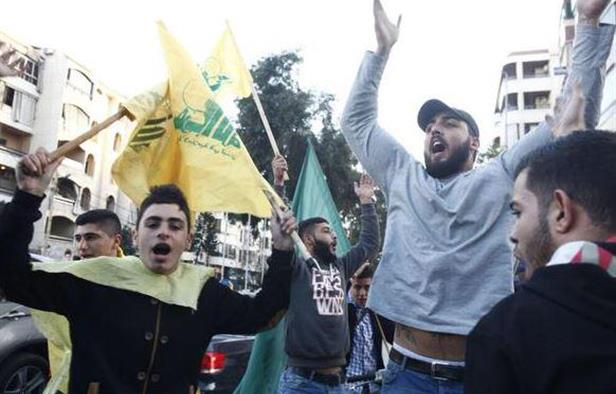In South Lebanon and Dahiyeh, festivity and fear after Hezbollah strike
Ana Maria Luca & Alex Rowell/Lebanon Now
Published: 28/01/2015
Behind shows of festivity in predominantly pro-Hezbollah parts of Lebanon after killing of two Israeli soldiers, residents say they are anxious about escalation
Shortly before noon Wednesday, Mohammad was working in his village in South Lebanon, in the vicinity of the disputed Shebaa Farms, when he heard that there might be something happening on the border. Like everyone living in South Lebanon, he knew war between Israel and Hezbollah was always possible at any moment. It had seemed particularly possible in recent days after Israel’s 18 January air strike in Quneitra, a few kilometers away in the Syrian Golan Heights, which killed six Hezbollah members, including late senior Hezbollah commander Imad Mughniyeh’s son, Jihad. Many southerners hoped neither Israel nor Hezbollah would choose this way of settling their dispute, especially given Hezbollah’s heavy involvement in the Syrian war, but Mohammad knew the prospect could never be ruled out.
When he heard Hezbollah had attacked an Israeli convoy in the Shebaa Farms, he took his coat, ran to his car and drove back home as fast as he could. His mother and father, both in their late 70s, were at home and all he wanted was to take them to Khiam, another village in South Lebanon, but further away from the border.
Mohammad, who asked for his precise location not to be mentioned, told NOW that the Israeli Defense Forces (IDF) had shelled the hills around several villages in the area, including his. “The bags are packed. Fleeing to Beirut is an option, but we’re going to wait and see how serious this gets. They seem to have stopped now. We’ll see for how long,” he said.
Many people in South Lebanon, whether Hezbollah supporters or not, similarly fled their villages after the exchange of fire over the border. “My husband told me in the morning not to leave the house today,” a resident of the southern town of Nabatieh who asked not to be named told NOW. “He had a feeling something might happen after the strike in Golan,” she added. She said she realized that something “was wrong,” when she saw Lebanese Army convoys heading towards the mountains. “That’s when I turned on the TV. My first reaction was to check where the passports were,” she said. “May God allow it to just go away! It’s not a good time for Hezbollah to start this, when their troops are in Syria and they are weak. But that’s what Israel has always wanted; to have it easy,” she added.
A hundred kilometers north, in Dahiyeh, the predominantly pro-Hezbollah southern suburb of Beirut that was largely devastated by Israeli bombardment in 2006, the reaction of residents was ostensibly one of cheer. Celebratory gunshots were fired in the air, and several residents told NOW festive sweets were distributed.
“From the moment news of the operation broke I’ve been talking to my friends with feelings of great happiness,” Dahiyeh resident Mhamad Kleit told NOW, arguing it was Hezbollah’s right to respond to Israel’s attack against it, particularly in what he described as occupied Lebanese territory. “Personally, I am very happy with the reply [to the Quneitra strike].” “The people of Beirut’s southern suburb were awaiting with impatience the reply of the resistance against the Israeli assault that targeted a group of resisters in Quneitra, and today the reply came, and the people in the streets spontaneously expressed their happiness,” said Dahiyeh resident Hamza Khansa.
In addition to the show of joy, though, residents told NOW there were also anxieties about a repeat of the 2006 scenario. “Without doubt, there is wariness of things developing into open warfare, and the experience of Israel’s aggression in 2006 remains present in people’s minds,” Khansa told NOW. According to fellow Dahiyeh local Zoulfikar Harakeh, there are also reports of “a small proportion of Dahiyeh residents starting to pack up their belongings” in preparation for moving out of the neighborhood in the event of outright war.
“Of course I am scared,” said Racha el-Amine, a Dahiyeh resident and former NOW staffer. “My house faces a Hezbollah security center. If a war breaks out, my house is gone.”
Should it come to that, some residents fear their relocation options will be much fewer than they were in 2006, in light of the ongoing Syrian war and the sectarian frictions it has exacerbated.
“The problem is that the situation is different than 2006,” said Mohamad Mokdad. “Now, people can’t find refuge in Syria, and after the [May] 2008 incidents [when Hezbollah gunmen briefly stormed several Beirut neighborhoods] a lot of people will not welcome us.”
Yet for some, like El-Amine, remaining in Dahiyeh in the event of war is out of the question.
“Of course I’d move somewhere else. I’m not prepared to die for Hezbollah.”
Ana Maria Luca tweets @aml1609. Alex Rowell tweets @disgraceofgod
Myra Abdallah contributed reporting.























